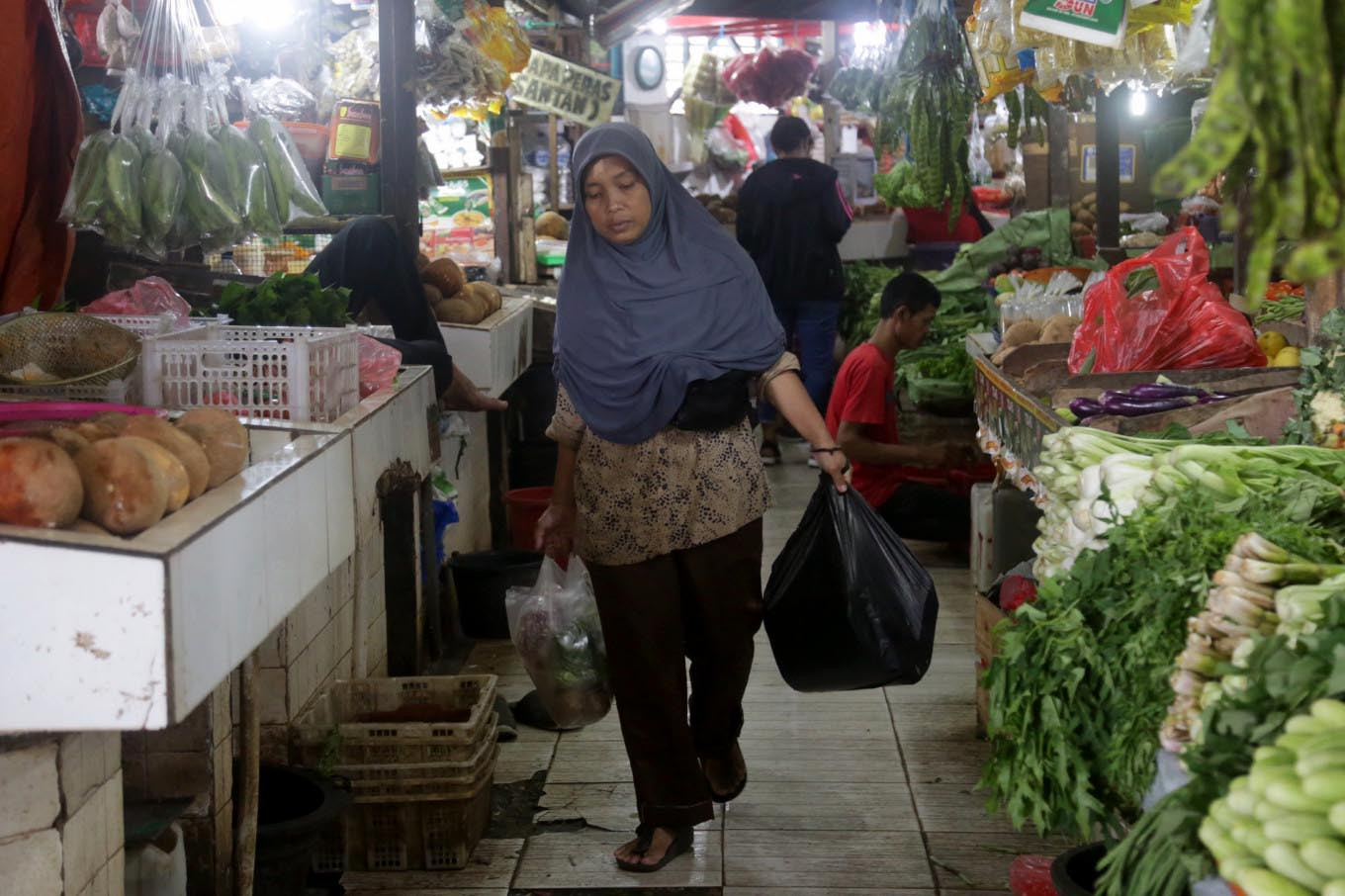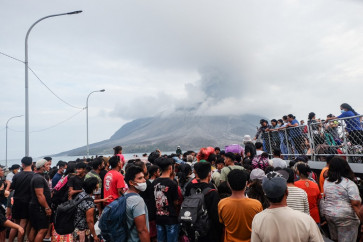Jakarta begins new chapter in plastic waste reduction
Jakarta will begin a new chapter in reducing plastic waste on Wednesday, when a gubernatorial regulation banning single-use plastic bags in traditional markets, modern supermarkets and minimarkets across Jakarta takes effect.
Change Size
 A woman shops for groceries on Jan. 27, 2020 at Tebet Barat market in Jakarta. (JP/Wendra Ajistyatama)
A woman shops for groceries on Jan. 27, 2020 at Tebet Barat market in Jakarta. (JP/Wendra Ajistyatama)
J
akarta began a new chapter in reducing plastic waste on Wednesday, when a gubernatorial regulation banning single-use plastic bags in traditional markets, modern supermarkets and minimarkets across Jakarta took effect.
A number of regions across the country have already imposed a similar ban – South Kalimantan’s Banjarmasin, East Kalimantan’s Balikpapan, Bali’s Denpasar and Jakarta’s satellite city of Bogor in West Java.
“In general, business players support this policy, but indeed there are some who have asked for it to be postponed,” Jakarta Environment Agency head Andono Warih said in a statement on Tuesday. “This policy actually reduces their cost of providing single-use plastic bags.”
The policy, he said, was instrumental in reducing plastic waste disposed of at Bantar Gebang landfill in Bekasi, West Java – the end point in Jakarta’s waste disposal process, which may only have one year left before reaching its maximum capacity.
“Hopefully, this will increase awareness and make people use single-use plastic bags more wisely and carry more environmentally friendly reusable bags,” he said.
The Jakarta administration has disseminated information on the policy to the management of 85 shopping centers, more than 2,000 convenience stores and 158 traditional markets across the city, as well as the general public, Andono said.
The policy – Gubernatorial Regulation No. 142/2019 – takes effect six months after its issuance on Dec. 31, 2019. The plan to issue such a regulation had been in the pipeline since 2018. It was put on hold as Anies wanted to include a provision on substitute materials to replace plastic bags.
The regulation serves as a legal basis for the use of eco-friendly bags in stores and markets. It carries punishments for shopping centers found violating the ban on single-use plastic bags, which range from written warnings and fines to permit suspension and termination.
The regulation, however, allows sellers to provide single-use plastic bags for non-packaged foodstuffs if there is no eco-friendly packaging available. It also excludes single-use plastic bags for online shopping and food deliveries.
Indonesian Retailers Association (Aprindo) secretary-general Solihin said some retailers had already begun to control the use of plastic bags in the past few months by no longer giving plastic bags away for free.
“Ready or not, we [retailers] must make a move, particularly after Aprindo disseminated its own policy to customers long ago,” Solihin said. “There might be [less compliance] in the early implementation [of the Jakarta plastic ban] but retailers should understand better by now how to prepare for it.”
City-owned market operator Pasar Jaya president director Arief Nasrudin said the firm continued to inform traders and buyers in traditional markets throughout Jakarta about the ban to ensure compliance after the policy takes effect on Wednesday.
“We will continue distributing information to traditional markets, including through leaflets and banners. Hopefully, traders and shoppers are ready to no longer use single-use plastic bags starting July 1,” he said.
The Jakarta Environment Agency reported that an average of 7,702 tons of the city's trash was disposed of at the Bantar Gebang landfill every day last year -- 34 percent of which was plastic waste.
Jakarta is home to 10 million people. But its role as the nation’s economic center means that a further 4 million people commute to the capital during the day.
With decreasing economic activity during the COVID-19 outbreak, Jakarta has seen a constant reduction of waste disposed of at Bantar Gebang, with the agency reporting 189,979 tons of waste sent to the landfill in May, 37.8 percent lower than 305,339 tons in January.
A survey by the Indonesian Institute of Sciences (LIPI), however, showed that plastic waste generated during the outbreak had increased because people in Greater Jakarta ordered food and daily supplies online more often between April and May while in self-isolation.
Of the participants in the poll, 62 percent said they ordered non-food products online more often, while 47 percent used online food delivery services more frequently.
The survey found that 96 percent of these items used plastic packaging.
East Jakarta resident Nadya Stephanie said a minimarket near her house had not provided customers with plastic bags for the past two months, but another convenience store continued giving away free plastic bags.
“It will probably be ineffective in the early days of implementation. People sometimes act like impulsive buyers despite not bringing their own bags," she said. "Hopefully, the policy will encourage us to bring reusable bags and generate less plastic waste.”
The first day of the ban did not go down without a hitch.
Siti Rohmani, a trader at Kramat Jati Market in East Jakarta, had replaced single-use plastic bags with reusable spunbond bags and used cardboard in order to comply with the new policy.
Siti sells the bags for Rp 2,000 (0.14 US cents) per piece or gives them for free if customers buy in bulk, and only if they need it. However, she said she still preferred it when buyers brought their own shopping bags.
Siti acknowledged that not all of her fellow traders in the market had replaced their single-use plastic bags, and neither did buyers who forgot to bring their own bags.
“It is just the first day. Not everyone [has complied with the rules],” she told the Post on Wednesday.
Later that afternoon, the environment agency's Andono said that the ban's effectiveness would be evaluated at the end of the first day, but also insisted that it was in place in some shopping malls.
“The use of eco-friendly bags in shopping centers has been implemented. We will evaluate the findings and further actions surely will follow. We are collating whatever findings we get in the field,” Andono said during his spot-check visit to the Grand Indonesia shopping mall in Central Jakarta.
He said the city administration, comprising the environment agency, public order agency (Satpol PP) and industry and SMEs agency, would routinely monitor the policy's implementation.
Editor's note: Updated with first day observations and edited for clarity.









